#disabled culture is
Explore tagged Tumblr posts
Note
Disabled culture is getting really upset at how little people on this website seem to care about people with OCD. Like, reblog bait all you want but dont tie morality and shit to it. Dont make it a ‘ill know if you dont reblog this!’ or ‘i dont trust you if you ignore this’ or ‘reblog to save a life’ or whatever, cause that wont make a person WANT to reblog it more, itll just fucking stress people out, which is made WORSE if any of said people have OCD (like myself)
Am I making ANY sense?
Yeah, that makes a lot of sense! I really hate that too. I don’t even have OCD and those sorts of posts still have had a horrible affect on my ability to engage with anything of that kind, politics especially, even when it is something I find important to talk about. I cannot imagine how awful it can get with OCD or similar disorders added to the mix.
For anyone who needs to hear it: the sort of person that you are is not determined by what you don’t reblog. You do not need to interact with anything or anyone to prove you’re not an evil person. If people start bringing morality into it, it is alright to block them! Take care of and protect yourselves!
#ocd culture is#disabled culture is#ableism tw#and no; the original poster will NOT know if you scroll past without rebloging#and you are not morally wrong for using social media for an escape from reality
156 notes
·
View notes
Note
Physically disabled with NPD culture is constantly fantasizing about fame for art that’s made even more difficult with said disabilities (anyone who suggests using generative AI is getting their fingers bit)
.
#cluster b culture is#cluster b#anonymous#mod orange#physically disabled#physically disabled culture is#disabled#disabled culture is#npd#npd culture is#physically disabled npd#physically disabled npd culture is
24 notes
·
View notes
Note
disabled with chronic pain culture is:
it hurts but I'll manage it hurts but I'll manage it hurts but I'll manage it hurts but I'll manage it hurts but I'll manage it hurts but I'll manage OH MY FUCKING GOD EVERYTHING HURTS I WANT TO FUCKING DIE THIS IS BULLSHIT I HATE LIFE I HATE MY BODY WHAT THE FUCKKKKKKK it hurts but I'll manage it hurts but I'll-
-+-
9 notes
·
View notes
Text
Nerve pain disorder culture is trying to play games on you laptop while somehow fully horizontal on your bed
3 notes
·
View notes
Text
[ID: the “I bring a sort of vibe” meme edited to say “I bring a sort of chronically ill & disabled vibe to the doctor’s office that medical professionals don’t really like”. End ID]

#ableism tw#disabled culture is#medical ableism#i didn’t realize i rbed this ages ago without an id. im so sorry screen reader users
5K notes
·
View notes
Text

blessed be the scavengers
I have stickers of this print up on my etsy shop for anyone who’s interested
terfs fuck off
made in 2024
#vulture#turkey vulture#vulture art#bird art#birdblr#vulture culture#animal art#nature art#bone art#linocarving#linocut print#linoprint#linocut#linogravure#block print#block printing#printmaker#printmaking#small artist#traditional art#traditional printing#traditional printmaking#artists on tumblr#original art#lesbian artist#butch artist#trans artist#scavengers#disabled artist#bird tag
10K notes
·
View notes
Text
i wanna say fuck you to anyone who shame disabled, chronically ill & neurodivergent people, especially homebound folks, for "spending too much time on their phone/on the internet/etc." when it's the only (Somewhat) accessible way for them to experience the world. many people don't get to get out much even if they want to because of their disabilities. shaming someone for trying to connect with the world, make friends and engage with hobbies in ways that are accessible to them is beyond cruel and unnecessary
#cripple punk#cripplepunk#crip punk#cpunk#actually disabled#chronic pain#disability culture#fibromyalgia#disability rights#disability advocacy#physical disability#c punk#angry cripple#queer cripple#cfsme#chronic fatigue syndrome#chronic fatigue#arthritis#diabetes#neurodiverse#neurodiversity#neurodivergent#autism#autistic#adhd#actually autistic#hypermobile eds#hypermobilty syndrome#our writing
17K notes
·
View notes
Text
So much of what society treats as a joke is just mocking disability. Their idea of lazy is a disabled person trying to survive, whether that be living with their parents as an adult or using pre prepared food. Cringe culture is based entirely around mocking neurodivergent people and their interests. Symptoms and characteristics of disability such as urgency issues, drooling, tremors, tics, strabismus and speech impediments are used as cheap punchlines.
In children’s tv shows disabled characters such as those with speech impediments are treated as a joke, with symptoms of disability being portrayed as synonymous to stupid.
This idea is being taught from a young age in the media and it’s engrained into our language and culture. This goes beyond jokes, it contributes to the alienation of people with disabilities.
Once you start noticing these things you realise how constant and normalised it is.
Reducing an entire person to a punchline is wrong. Using a disability symptom as an insult is wrong. It’s disturbing how normalised it is to not treat people with basic decency and respect.
#disabled#disability#morbid midnight#cpunk#physical disability#neurodivergence#cringe culture is dead#cringe culture is ableist#ableism#disabled advocacy#disabled rights#cripple#angry cripple#cripple posting#crippled#cripple punk#tw ableism#ableist#disabled activism
4K notes
·
View notes
Text
do able-bodied people not understand that if disabled people call out of work every time they don't feel good that we would call out of work every fucking day?
like honestly. what do you think being disabled means?
#if one more person tells me to take a sick day i'm going to throw something at them#i just honestly cannot anymore#disabilties#disabled#actually disabled#epilepsy#ehlers danlos syndrome#physical disability#neurological disability#actually epileptic#zebra#chronically ill#chronic illness#spoonie#chronic fatigue#chronic pain#c punk#crip punk#cripple punk#fuck capitalism#anti work#disability culture#1k#5k#10k
11K notes
·
View notes
Text
As I keep shouting into the void, pathologizers love shifting discussion about material conditions into discussion about emotional states.
I rant approximately once a week about how the brain maturity myth transmuted “Young adults are too poor to move out of their parents’ homes or have children of their own” into “Young adults are too emotionally and neurologically immature to move out of their parents’ homes or have children of their own.”
I’ve also talked about the misuse of “enabling” and “trauma” and “dopamine” .
And this is a pattern – people coin terms and concepts to describe material problems, and pathologization culture shifts them to be about problems in the brain or psyche of the person experiencing them. Now we’re talking about neurochemicals, frontal lobes, and self-esteem instead of talking about wages, wealth distribution, and civil rights. Now we can say that poor, oppressed, and exploited people are suffering from a neurological/emotional defect that makes them not know what’s best for themselves, so they don’t need or deserve rights or money.
Here are some terms that have been so horribly misused by mental health culture that we’ve almost entirely forgotten that they were originally materialist critiques.
Codependency What it originally referred to: A non-addicted person being overly “helpful” to an addicted partner or relative, often out of financial desperation. For example: Making sure your alcoholic husband gets to work in the morning (even though he’s an adult who should be responsible for himself) because if he loses his job, you’ll lose your home. https://www.nytimes.com/2022/07/08/opinion/codependency-addiction-recovery.html What it’s been distorted into: Being “clingy,” being “too emotionally needy,” wanting things like affection and quality time from a partner. A way of pathologizing people, especially young women, for wanting things like love and commitment in a romantic relationship.
Compulsory Heterosexuality What it originally referred to: In the 1980 in essay "Compulsory Heterosexuality and Lesbian Existence," https://www.journals.uchicago.edu/doi/abs/10.1086/493756 Adrienne Rich described compulsory heterosexuality as a set of social conditions that coerce women into heterosexual relationships and prioritize those relationships over relationships between women (both romantic and platonic). She also defines “lesbian” much more broadly than current discourse does, encompassing a wide variety of romantic and platonic relationships between women. While she does suggest that women who identify as heterosexual might be doing so out of unquestioned social norms, this is not the primary point she’s making. What it’s been distorted into: The patronizing, biphobic idea that lesbians somehow falsely believe themselves to be attracted to men. Part of the overall “Women don’t really know what they want or what’s good for them” theme of contemporary discourse.
Emotional Labor What it originally referred to: The implicit or explicit requirement that workers (especially women workers, especially workers in female-dominated “pink collar” jobs, especially tipped workers) perform emotional intimacy with customers, coworkers, and bosses above and beyond the actual job being done. Having to smile, be “friendly,” flirt, give the impression of genuine caring, politely accept harassment, etc. https://weld.la.psu.edu/what-is-emotional-labor/ What it’s been distorted into: Everything under the sun. Everything from housework (which we already had a term for), to tolerating the existence of disabled people, to just caring about friends the way friends do. The original intent of the concept was “It’s unreasonable to expect your waitress to care about your problems, because she’s not really your friend,” not “It’s unreasonable to expect your actual friends to care about your problems unless you pay them, because that’s emotional labor,” and certainly not “Disabled people shouldn’t be allowed to be visibly disabled in public, because witnessing a disabled person is emotional labor.” Anything that causes a person emotional distress, even if that emotional distress is rooted in the distress-haver’s bigotry (Many nominally progressive people who would rightfully reject the bigoted logic of “Seeing gay or interracial couples upsets me, which is emotional labor, so they shouldn’t be allowed to exist in public” fully accept the bigoted logic of “Seeing disabled or poor people upsets me, which is emotional labor, so they shouldn’t be allowed to exist in public”).
Battered Wife Syndrome What it originally referred to: The all-encompassing trauma and fear of escalating violence experienced by people suffering ongoing domestic abuse, sometimes resulting in the abuse victim using necessary violence in self-defense. Because domestic abuse often escalates, often to murder, this fear is entirely rational and justified. This is the reasonable, justified belief that someone who beats you, stalks you, and threatens to kill you may actually kill you.
What it’s been distorted into: Like so many of these other items, the idea that women (in this case, women who are victims of domestic violence) don’t know what’s best for themselves. I debated including this one, because “syndrome” was a wrongful framing from the beginning – a justified and rational fear of escalating violence in a situation in which escalating violence is occurring is not a “syndrome.” But the original meaning at least partially acknowledged the material conditions of escalating violence.
I’m not saying the original meanings of these terms are ones I necessarily agree with – as a cognitive liberty absolutist, I’m unsurprisingly not that enamored of either second-wave feminism or 1970s addiction discourse. And as much as I dislike what “emotional labor” has become, I accept that “Women are unfairly expected to care about other people’s feelings more than men are” is a true statement.
What I am saying is that all of these terms originally, at least partly, took material conditions into account in their usage. Subsequent usage has entirely stripped the materialist critique and fully replaced it with emotional pathologization, specifically of women. Acknowledgement that women have their choices constrained by poverty, violence, and oppression has been replaced with the idea that women don’t know what’s best for themselves and need to be coercively “helped” for their own good. Acknowledgement that working-class women experience a gender-and-class-specific form of economic exploitation has been rebranded as yet another variation of “Disabled people are burdensome for wanting to exist.”
Over and over, materialist critiques are reframed as emotional or cognitive defects of marginalized people. The next time you hear a superficially sympathetic (but actually pathologizing) argument for “Marginalized people make bad choices because…” consider stopping and asking: “Wait, who are we to assume that this person’s choices are ‘bad’? And if they are, is there something about their material conditions that constrains their options or makes the ‘bad’ choice the best available option?”
#mad pride#neurodiversity#ableism#ageism#youth rights#liberation#disability rights#classism#capitalism#mental health culture#pop psychology#feminism#emotional labor
7K notes
·
View notes
Text
"You can't have [experience] because you don't identify as [label]!!!" how do I explain to people that experiences exist outside of and prior to the formation of specific language to talk about them
"You can't have [experience] because you don't think of it through [framework/explanation/etc]!!!" how do I explain to people that experiences exist outside of and prior to any formal cosmology, hypotheses, or explanation assigned to them
#extra salty because I am disabled and transgender and have to experience this often enough offline.#these folks need to just go ahead and admit to being conservatives in patchwork trenchcoats and get off Tumblr already.#personal#(also the requirement of specific niche western culture language-locked frameworks to be taken as legitimate is also rooted in colonialism.#but nobody is ready to have that conversation.)
2K notes
·
View notes
Text
An important thing I’ve been thinking about and that I think could use more talking about as a whole, especially this disability pride month, is that you cannot approach disability with the exact same sort of identity politics that queer identity is approached with!
Disability accounts for the largest minority of humanity, and as such, our experiences cannot be condensed down into a short, concise list of things that need to be done or a single attitude to be held.
The needs we have as disabled people are going to vary greatly, even between two people with the same conditions. The things that one person may find helpful may be a hinderance to another, and that is okay! Accessibility requires flexibility. Don’t assume, even if you’re disabled person talking to another disabled person, that you can speak for them. (Ableds, don’t speak for us at all. There is so, so much nuance to disabled experiences, and a lot of it takes time and effort to explain that we don’t feel comfortable spending because it gets thrown back in our faces.)
Disability Pride doesn’t necessarily mean lining up on the streets cheering about our disabilities. Disability Pride doesn’t necessarily mean loving our disabilities. It’s about calling out and fighting back against the wide variety of ableism that we’re put through. It’s about advocating for the rights we’re denied and calling out the abuse we’re forced to sit and take.
Disability Pride Month is about recognizing that we’re no lesser than any abled person. We have worth and value. We deserve to live to the fullest capacity the world can provide us, regardless of our privilege or monetary status. We deserve to choose and advocate for ourselves. Don’t forget that.
So happy disability pride to everyone newly disabled, to everyone who’s been disabled their whole lives, to everyone who hates their disability, and everyone who loves their disability, and everyone moving forward and those still grieving, and everyone in between. You are important. Your life is important. Don’t let anyone tell you otherwise.
#disability pride month#ableds are encouraged to reblog but if you choose to comment choose your words carefully.#AND WEAR A MASK WHEN YOU’RE SICK FOR THE LOVE OF ALL THINGS GOOD IN THIS WORLD#disabled culture is
230 notes
·
View notes
Text
Regarding the 'Doctors' Saying':* "If you hear hoof-beats, look for a horse, not a zebra."
Okay, fine. But if someone calls you and says: "There's a zebra in my front yard," don't just tell them "Actually, you're wrong. That's a horse," and hang up.
At least call around and see if there's a zoo nearby, or a visiting circus, and ask if they've had any animals escape, lately. And maybe ask them to double-check.
*As I've heard reported by the Elhers-Danlos Syndrome and Myalgic Encephalomyelitis/Chronic Fatigue Syndrome communities.
#my own shower thoughts#undiagnosed & misdiagnosed conditions#disability culture#doctor frustrations
5K notes
·
View notes
Note
hypermobile culture is constantly contorting yourself into various positions to try to relieve the strain on your body :’)
-+-
6 notes
·
View notes
Text
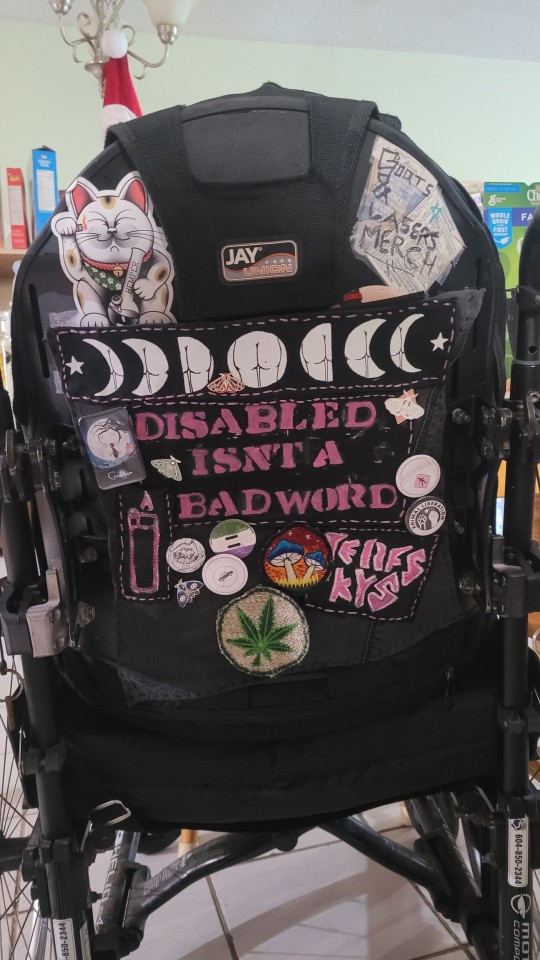
I made a new backpatch for my wheelchair. The first picture is the new one and the second is the old.
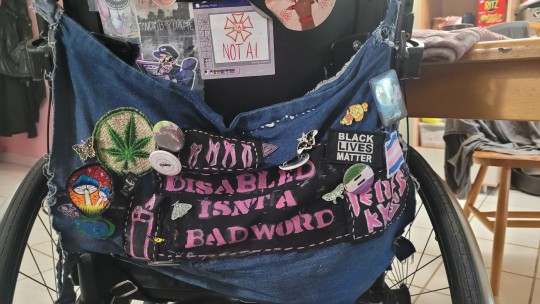
I made this new one with velcro which attaches much cleaner to the chair. That way, you can actually see all the patches.
I find these backpatches are much better than a traditional battle jacket for me. As Battle jackets get really heavy, which makes it harder to push myself. This way I can still participate.
If you make one I would love to see!
#cripple punk#queer punk#punk#battle jacket#wheelchair user#wheelchair#diy punk#diy#patches#diy patches#diy or die#craftblr#sewing#physical disability#trans punk#queer art#queercore#punk culture#disabled#mobility aid user#mobility aid#cripple shit#punk patch#up the punx#punk fashion#punk style#trans punks#chronic pain
1K notes
·
View notes
Text
Hindsight is 20/20, but I don't think you needed to be psychic to guess that destroying ALL the shimmer supply was a bad idea.

In Act Three it took three whole doctors to save Vi's life after she gets slashed by a Noxian blade across the chest. Yet in s1 it took a single drop of shimmer to save Vi from the deep stab in the gut Sevika gave her without any other form of medical intervention.

There's just a really gross sense of irony that Caitlyn and Piltover at large took away Zaun's main source of medical care (as controversial as it may be), and then put it's people through a meat grinder battle while withholding such care.
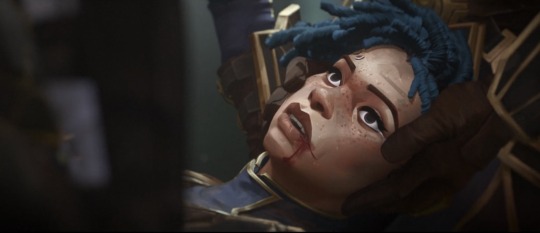
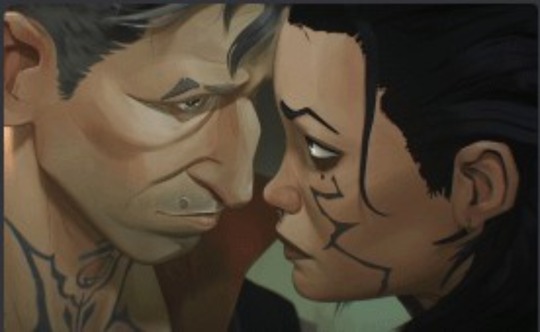
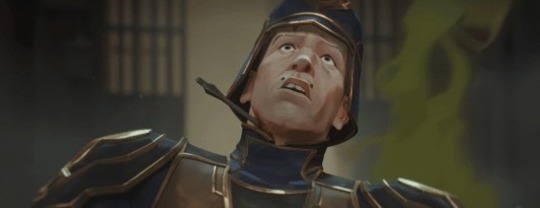
It doesn't help that the meat grinder battle was useless ploy for Jayce to get close to Viktor and so a lot of people, specifically Zaunites, died for nothing.
#arcane#caitlyn kiramman#vi arcane#gertie arcane#arcane meta#on one hand there's this completely unexplored aspect of arcane#where zaun is a place that actually has developed advance technology to deal with it's ailing population#while Piltover's side lagged behind bcuz they're culture has no real sense of urgency to care for the disabled and ill#Piltover's clean and healthy environment is already a large preventative measure for it's populace so they don't race to develop treatments#and cures#but just like the overall nature of the PnZ conflict in arcane it's inclusion in the show is outright shallow and ultimately dropped by s2#bcuz the writers aren't in fact interested in it#but oh well bcuz i am#that whole finale happened without any sense of shame remorse of self awareness from anyone on the piltovan side#and that wud be fine if ANYBODY else acknowledged including the writers#srsly the only zaunite necessary in that fight was ekko and that's it#everyone else was literally set dressing
531 notes
·
View notes